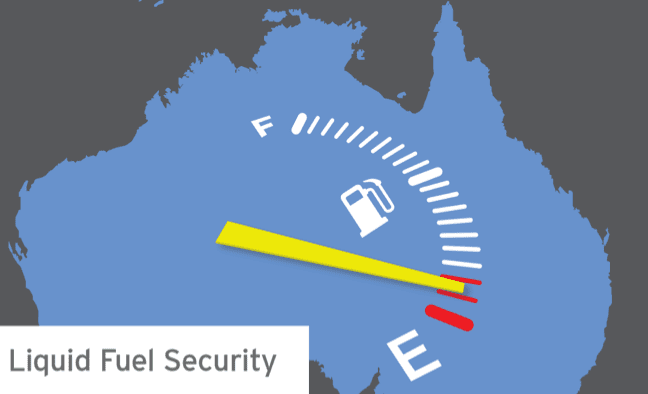Australia’s dependence on traditional and imported liquid fuel sources and transport technologies is putting our national security – and very way of life – at risk, a new study has found. Yet Australia continues to ignore alternative fuel strategies, that could include more renewable energy and electric vehicles.
An NRMA-commissioned report on the nation’s liquid fuel security, released on Monday, warns that Australia’s severely declining oil refining industry, and increasing demand for liquid fuels, could result in a scenario in 2030 where it has less than 20 days worth of fuel in reserve, and 100 per cent imported liquid fuel dependency.
The report says there are potential scenarios that could put the daily lives of Australians at risk, yet “there is no plan to stop our dependency growing to 100% or to halt the further decline of our fuel security.”
The report, written by retired Air Vice-Marshal John Blackburn, finds that Australia’s dependence on imported liquid fuel and oil for transport has grown from around 60 per cent in 2000 to 90 per cent today, with no plan or public government policy to stop this blowing out to 100 per cent.
Such a lack of capacity, says Blackburn, “puts at risk our national security and lifestyle should there be a major event that impacts our liquid fuel supply chain.”
A confrontation in the Asia-Pacific region, for example, could see Australians suffer food shortages, a lack of adequate access to medical services or pharmaceutical supplies, an inability get to work and, if the problem lasts for more than a few weeks, no work to go to. “It is that serious,” says the report.
Titled Australia’s Liquid Fuel Security, the report recommends a comprehensive, national response that addresses both demand and supply sides of the liquid fuel delivery chain, including increased focus on the technologies and energy sources used and alternative fuel supply.
This is not the first time an NRMA report has called for greater investment in, and focus on, developing Australia’s alternative fuels sector. Back in 2008, it commissioned the Jamison Group to develop a roadmap for greener, alternative transport fuels to help end Australia’s dependence on imported fossil fuels.
At the time, Jamison estimated that “if Australia were thrown back on its own oil resources… sometime in 2014 the heavily transport-dependent economy would literally grind to a halt.”
The report, updated by Jamison in 2010, proposed a series of steps to end Australia’s dependence on imported oil and secure its own transport energy future; the first being to establish a national energy policy and department specifically charged with the development of greener, alternative fuels and the fast-tracking of electric vehicle infrastructure.
The 2010 report states that steps taken immediately could see Australia’s replace coal-generated electricity with gas and wind, biomass, solar, thermal and marine energy within 20 years. Electric vehicles running on this electricity would produce zero emissions.
“Australia is in a much better position to tackle this problem because of the abundance of resources we have and the capacity for innovative research and development – what we need now is leadership,” NRMA Motoring & Services President Wendy Machin said four years ago.
“While we export record amounts of gas to other parts of the world for their energy use, we should also start developing it for our own transport consumption at home.
“We know that we can increase our production of bio-fuels from non-food sources as a short-term measure to reduce our dependence on oil and legislate to ensure cars are more fuel efficient.
Four years later, and – as this chart from the current NRMA-commissioned report shows, below – there is still plenty of room for improvement in the development of Australia’s alternative fuels sector.
The 2010 report also recommended fast-tracking the adoption of the electric car and charging stations as a viable alternative to the internal combustion engine. But, NRMA warned that “unless we upgrade our electricity grid to be generated by renewable energy then there will be no environmental benefit gained from doing away with oil.”
Today, in its current report – as in its submission to the government’s Energy White Paper earlier this month – NRMA again stressed the importance of alternative fuels, calling for “a much more comprehensive review of alternative and emerging energy sources and technology for transport.”
NRMA argues there is ample scope for alternative and emerging energy sources and technology to play a significant role in enhancing Australia’s transport fuel security, as well as supporting a reliable and affordable transport fuel sector and reducing transport related greenhouse gas emissions.
On this last point, the report notes, “it is critical to remember that any changes we make to our energy mix in order to improve our fuel security should not be at the expense of climate or environment factors.” Otherwise, the report warns, “we will merely substitute one potential crisis for another.”
The question we should be asking our Government and ourselves, says the report, is this: “Is it important enough to make sure we retain some refining capability in Australia so we keep the ability to meet a proportion of our liquid fuel needs from Australian-controlled sources?
“Waiting for a catastrophic failure before acting could result in damage to our security, our economy and our way of life. And the longer we wait to act, the fewer options we will have.”









